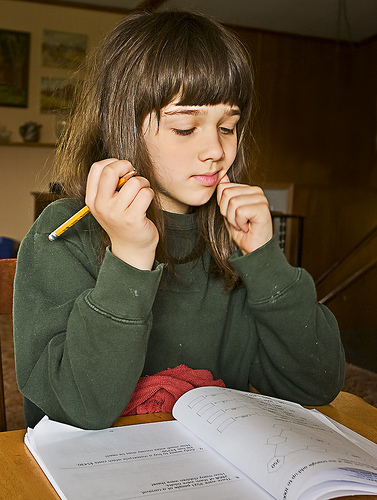 Virginia Woolf famously said (In a wildly different context), that “a room of one’s own” is necessary for a sense of identity and intellectual progress. She could easily be talking about any young mind that is in the process of becoming a self-directed student and thinker. While our children still need the guidance of adults, they also require a study space conducive to becoming their own person and developing the habits that will carry them through life. Here are some sturdy guidelines to help your child craft precisely that space.
Virginia Woolf famously said (In a wildly different context), that “a room of one’s own” is necessary for a sense of identity and intellectual progress. She could easily be talking about any young mind that is in the process of becoming a self-directed student and thinker. While our children still need the guidance of adults, they also require a study space conducive to becoming their own person and developing the habits that will carry them through life. Here are some sturdy guidelines to help your child craft precisely that space.
1. Get The Balance Right
As with so many areas of life, the key to creating an ideal study space lies in finding a happy medium. In this case, your aim is to help create a zone that includes positive stimulation yet does not overload the senses with negative distractions.
On the one hand, the study space should be something of a sanctuary: a place of serenity that naturally encourages concentration. A busy decoration scheme is to be avoided, and if at all possible choose colors that encourage focus. In particular, green-hued walls are likely to instill a sense of safety and focus.
While you want to encourage a low-key mood, you also don’t want to make the room feel like a minimalist dungeon. A few pictures of positive role models inscribed with inspirational quotes might do the trick or even positive affirmations.
2. Make The Best of Technology
If there is one villain in the war against dedicated study habits, it’s the internet. Facebook and other social media sites and online games are one thing, but even the hyperlinked nature of the web can easily lead even the most self-disciplined student into an ADD-like spiral.
At the same time, the Internet is an immeasurable research tool, and within many tech-savvy school systems, classroom bulletin boards and homework submission sites such as Turnitin.com are mandatory tools. So how should parents encourage beneficial internet usage without having to loom over students’ shoulders? Start with open communication and a spirit of trust. If you begin to see a correlation between net usage and poor grades, you might need to set up a separate workspace for study-only computer time. If your household won’t accommodate this, you may need to resort to a filtering program that will only allow access to study-appropriate sites.

There are plenty of years of school work ahead. Make sure your child is prepared. Image: chefranden via Flickr cc.
3. Instill A Core of Organization
Clutter is not only a visual distraction, but it’s also a stumbling block on the road to efficiency. Therefore, from as young an age as possible, help your child develop an innate sense of having “a place for everything and everything in its place.” Physically, this can be done by providing file folders; organizational bins for pens, pencils, and other staples; and clearly marked storage containers for a long-term organization.
Among today’s generation, a virtual organization is just as crucial as in the physical world, so desktop maintenance should be the Trapper Keeper of the computer age. On top of demonstrating the value of file folders and icon management, a walk-through of Google’s one-stop filing system will give your child an excellent foundation for education and even future employment.
Use Visual Planning… Good study habits have as much to do with time as space, so provide easy-to-digest indexes of progress and highly visible pipelines for homework and projects. Using calendars, task lists, and timelines will not just serve as a way for you and your student to track progress, it will also boost motivation and confidence by putting progress in concrete terms.
If one thread runs through all of these guidelines, it’s that parents must provide firm reinforcement and world-wisdom without becoming unyielding martinets. To put it another way, every parent must play an ongoing, flexible game of “good cop, bad cop.” Like children themselves, a study area is a work in progress that should adapt to emerging needs at the same time as it helps establish habits that will mature as the years go by. As the old cliché goes, they’ll thank you when it’s over.
Marcela De Vivo is a freelance writer from Los Angeles, currently working with Soothing Walls. Her writing covers everything from health and wellness to parenting, fitness, and design. Check more of her writing by following her Twitter account today!



